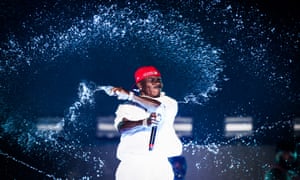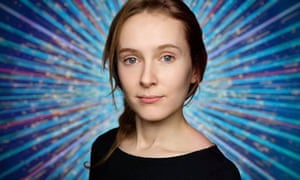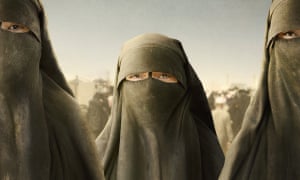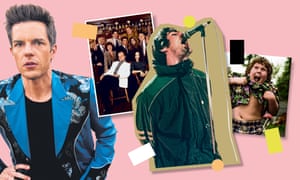DaBaby steps: is hip-hop finally conquering homophobia?
There has been a loud and disgusted backlash against US rapper DaBaby after he made homophobic remarks. But queer MCs explain that there’s still more work to be done

After seeing the online backlash to rapper DaBaby’s recent homophobic and misogynistic onstage remarks, Bugz Gutta was “shocked and grateful”. Born William Bailey, the up-and-coming New York MC, a proudly out black gay man, is still adjusting to such positive outcomes. He dubs himself “hip-hop’s Omar from The Wire”, thanks to his prior life of crime and the years he spent behind bars, enduring verbal, physical and sexual abuse before finding peace and success as a musician. He hopes the fallout that DaBaby has faced “sets an example. So people realise it’s not OK to put hate and harm out there.”
Last week, DaBaby ranted on stage: “If you didn’t show up today with HIV, Aids … that’ll make you die in two to three weeks, then put your cellphone lighter up.” The rapper, whose 2020 album Blame It on Baby became his second US No 1 in less than a year, then said: “Ladies, if your pussy smell like water… Fellas, if you ain’t sucking dick in the parking lot, put your cellphone lighter up.” As pushback mounted online, DaBaby truculently apologised – “But the LGBT community… I ain’t trippin on y’all, do you. Y’all business is y’all business” – and released a music video where he held up a sign reading “Aids” before shooting a pair of men. His Levitating collaborator Dua Lipa, the Roots’ drummer Questlove, Madonna and Elton John all decried him; US radio stations dropped his version of Levitating from playlists. After the Lollapalooza festival and others axed DaBaby from their lineups, he apologised more soberly on Instagram, but has since deleted that apology.
But Bugz Gutta isn’t ready to forgive. “So many people from our community are like: ‘OK, he learned his lesson.’ But it goes back to self-hate and self-worth in the gay community, and understanding it’s not OK for anyone to have a big platform and say these things. Him putting out another apology that he clearly didn’t write, and that clearly isn’t how he feels – just how gullible does he think we are?”
DaBaby’s mea culpa was indeed “too little, too late” and appeared to be financially motivated, says Deadlee. Born Joseph Lee, the Las Vegas MC is widely considered to be a queer rap pioneer for spearheading the HomoRevolution tour in 2007. He took lyrical aim, on his 2006 album Assault With a Deadlee Weapon, at homophobic lines by Eminem, DMX and other famous MCs, and his candid bars about struggling and triumphing as an openly gay rapper have garnered plenty of praise.
Deadlee says he would be more impressed by DaBaby if he volunteered with an HIV organisation and then came back to “tell us what you learned”, and is equally unsatisfied by the broader public reaction. Despite longtime community leaders like Elton John weighing in, Deadlee longs for more pushback from rap’s biggest stars, in the vein of the unanimous criticism of country singer Morgan Wallen for using a racial slur. “It would definitely help if hip-hoppers would speak out,” Deadlee says. Instead, some hip-hop elders like TI and Boosie have voiced their support for DaBaby, the latter doing so in a homophobic Instagram rant of his own.
Aina Brei’Yon, a queer rapper from Chicago, has been equally alarmed by the lack of outrage against DaBaby’s disparaging of women. “The misogyny has long been in his music, but he put it directly in our faces” while ranting onstage, she says, “so that we had no choice but to pay attention.” Brei’Yon adds that the LGBTQ+ community should not “wait until we are offended to either speak on things, or for us to support one another”, making her pine for proactive, lasting dialogue and action. She frequently takes to Instagram Live, speaking on matters such as how the LGBTQ+ community too often “latches on to those outside of us for acceptance, and then they disappoint us. So we need more intentional support of one another.”
It is all part of what Deadlee sees as impressive recent progress for queer visibility that nevertheless “still has such a long way to go”. Indeed, 2021 had appeared to be a banner year for LGBTQ+ representation in rap. Behemoth hitmaker Lil Nas X released two assuredly queer music videos this year: Montero (Call Me By Your Name) and Industry Baby. The latter features prison inmates sporting pink uniforms in a reclamation of how numerous incarcerated gay men have been forced to wear that colour, before subsequent shaming or even segregation. Montero meanwhile became instantly famous for teaming homoerotic imagery with Biblical references. Though it riled much of the Christian right, it was also lavishly acclaimed by many progressives, and has so far netted over 300m Youtube views.
Deadlee has enthusiastically watched that widespread success. Twenty years after his producer told him he was decades ahead of his time, and after shock jock Howard Stern told him following an interview “I love what you’re doing, but you have to learn to make money doing it”, Deadlee is thrilled to finally see a gay rapper rule the charts and boost the community’s visibility. Things were certainly different during Deadlee’s heyday – he recalls asking RuPaul for a feature after opening for the drag icon early in his career. RuPaul’s response? “I’d love to, but your music is a bit too out there for me.” Death threats eventually led Deadlee to take a step back from music and focus on acting for a period.
Lil Nas X is clearly ushering in a new era as not only the highest-selling LGBTQ+ rapper of the moment, but also one of the most popular artists of any genre or demographic. But he is by no means the only assuredly creative, courageously outspoken queer rapper. Social media abounds with gay, lesbian, trans and non-binary MCs posting both dazzlingly cinematic music videos, and songs that are compelling enough to let listeners of all stripes relate.
Many of them are poised to surge into the mainstream. Big Freedia has not only garnered goodwill as a proud queer-and-out artist, for instance, but is adored for her upbeat “bounce” bangers, and was sampled by Drake on 2018’s Nice for What. Via email, she says she strives to celebrate the beauty of LGBTQ+ culture in her music, and that the title track of her forthcoming EP Big Diva Energy is about how “we want to feel that power when we walk into a room and in life, like we are in charge and no one can take us down. It’s about owning who you are. It doesn’t matter if you are male, female, gay and straight. We all want to feel it!”
Freedia went on to praise other artists for boosting LGBTQ+ visibility such as Mykki Blanco, who has worked with Madonna, Kanye West and Teyana Taylor. Other prime examples of prominent LGBTQ+ MCs include New York’s Young MA, who won fans over with frank and forthright songs about her female muses, and Nigeria-born and south London-raised MC Darkoo who rapped “swing both ways so bring your lady” on Tion Wayne and Russ Millions’ recent No 1 UK hit Body. Kevin Abstract of internet-adored rap boyband Brockhampton is out and proud, and the Grammy-winning Tyler, the Creator seems to frequently direct romantic rhymes towards men. Backxwash – a Zambian-Canadian transgender rapper who won Canada’s Mercury-equivalent Polaris prize in 2020 – cheekily tweeted: “DaBaby just emailed me and asked if we can do Stan at the Grammys” in reference to Eminem’s answering charges of homophobia by performing with Elton John.
And yet for now, Lil Nas X remains the rare openly queer rapper with major crossover success. Others have struggled, such as iLoveMakonnen, who couldn’t match his Drake-assisted 2014 hit Tuesday: “It’s hard to be out in genres where being gay, or expressing your sexuality, is frowned upon,” he told the LA Times in 2019. “We are finally starting to see queer black men celebrated in the genre. But this is still a genre that has never been supportive of change.” Bugz Gutta says he hopes “labels will now think other queer artists can make it like Lil Nas X did. But that’s hard when you have all this toxic talk about LGBTQ+ people out there.” In the meantime, he says rappers like him can use accessible technology and social media to “create our own stuff. Because we’re needed in straight people’s spaces as workers, but they don’t see us as peers.”
Bugz Gutta says he is content to face down marginalisation and backlash for the time being, though, in the hope that “when six and seven-year-olds who are gay and bi and trans reach a certain age and want to be in the entertainment industry, it will be different for them.”
As Big Freedia puts it: “For sure we still have a long way to go, [but] it just motivates me more to keep doing what I’m doing. I’m excited and honoured to be a part of the change.”



